Report on Discrimination Between Part-Time and Full-Time Hotel Staff
VerifiedAdded on 2023/06/04
|9
|2444
|167
Report
AI Summary
This report examines the discrimination faced by part-time student employees in the hotel industry compared to their full-time counterparts. It identifies the motivations of both students seeking part-time work and employers who benefit from a flexible, lower-cost workforce. However, this arrangement often leads to unfair treatment, including low wages, lack of benefits, and limited career development opportunities. The report uses organizational culture theory to explain the root causes of this problem, highlighting how a functional and clan culture can promote equality and eliminate mistreatment. Recommendations focus on following the law, assessing employee needs, and fostering a constructive organizational culture that values fairness and equal opportunity. Ultimately, addressing discrimination is crucial for improving employee morale, commitment, and overall firm performance. Desklib offers similar solved assignments and past papers for students.
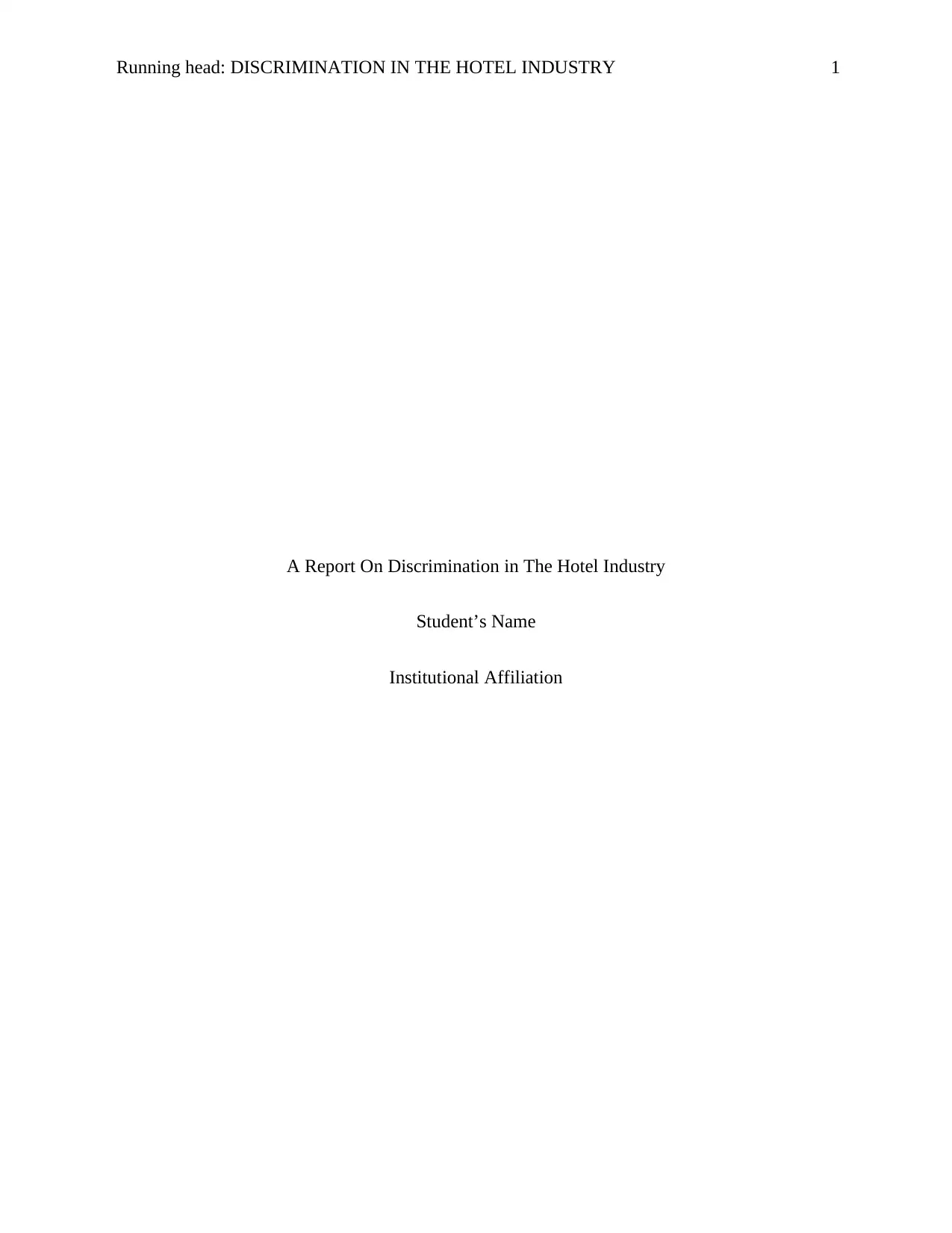
Running head: DISCRIMINATION IN THE HOTEL INDUSTRY 1
A Report On Discrimination in The Hotel Industry
Student’s Name
Institutional Affiliation
A Report On Discrimination in The Hotel Industry
Student’s Name
Institutional Affiliation
Paraphrase This Document
Need a fresh take? Get an instant paraphrase of this document with our AI Paraphraser
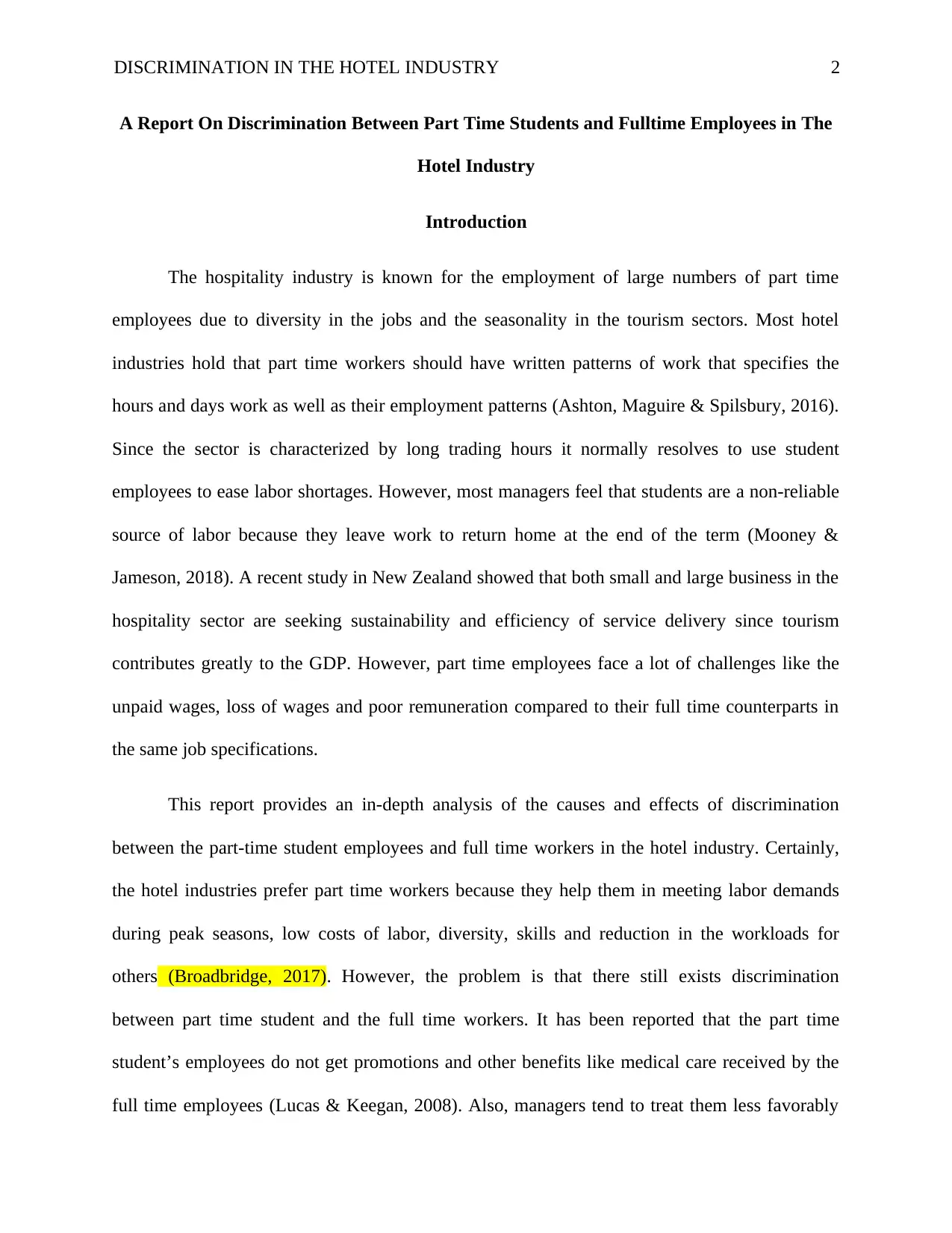
DISCRIMINATION IN THE HOTEL INDUSTRY 2
A Report On Discrimination Between Part Time Students and Fulltime Employees in The
Hotel Industry
Introduction
The hospitality industry is known for the employment of large numbers of part time
employees due to diversity in the jobs and the seasonality in the tourism sectors. Most hotel
industries hold that part time workers should have written patterns of work that specifies the
hours and days work as well as their employment patterns (Ashton, Maguire & Spilsbury, 2016).
Since the sector is characterized by long trading hours it normally resolves to use student
employees to ease labor shortages. However, most managers feel that students are a non-reliable
source of labor because they leave work to return home at the end of the term (Mooney &
Jameson, 2018). A recent study in New Zealand showed that both small and large business in the
hospitality sector are seeking sustainability and efficiency of service delivery since tourism
contributes greatly to the GDP. However, part time employees face a lot of challenges like the
unpaid wages, loss of wages and poor remuneration compared to their full time counterparts in
the same job specifications.
This report provides an in-depth analysis of the causes and effects of discrimination
between the part-time student employees and full time workers in the hotel industry. Certainly,
the hotel industries prefer part time workers because they help them in meeting labor demands
during peak seasons, low costs of labor, diversity, skills and reduction in the workloads for
others (Broadbridge, 2017). However, the problem is that there still exists discrimination
between part time student and the full time workers. It has been reported that the part time
student’s employees do not get promotions and other benefits like medical care received by the
full time employees (Lucas & Keegan, 2008). Also, managers tend to treat them less favorably
A Report On Discrimination Between Part Time Students and Fulltime Employees in The
Hotel Industry
Introduction
The hospitality industry is known for the employment of large numbers of part time
employees due to diversity in the jobs and the seasonality in the tourism sectors. Most hotel
industries hold that part time workers should have written patterns of work that specifies the
hours and days work as well as their employment patterns (Ashton, Maguire & Spilsbury, 2016).
Since the sector is characterized by long trading hours it normally resolves to use student
employees to ease labor shortages. However, most managers feel that students are a non-reliable
source of labor because they leave work to return home at the end of the term (Mooney &
Jameson, 2018). A recent study in New Zealand showed that both small and large business in the
hospitality sector are seeking sustainability and efficiency of service delivery since tourism
contributes greatly to the GDP. However, part time employees face a lot of challenges like the
unpaid wages, loss of wages and poor remuneration compared to their full time counterparts in
the same job specifications.
This report provides an in-depth analysis of the causes and effects of discrimination
between the part-time student employees and full time workers in the hotel industry. Certainly,
the hotel industries prefer part time workers because they help them in meeting labor demands
during peak seasons, low costs of labor, diversity, skills and reduction in the workloads for
others (Broadbridge, 2017). However, the problem is that there still exists discrimination
between part time student and the full time workers. It has been reported that the part time
student’s employees do not get promotions and other benefits like medical care received by the
full time employees (Lucas & Keegan, 2008). Also, managers tend to treat them less favorably
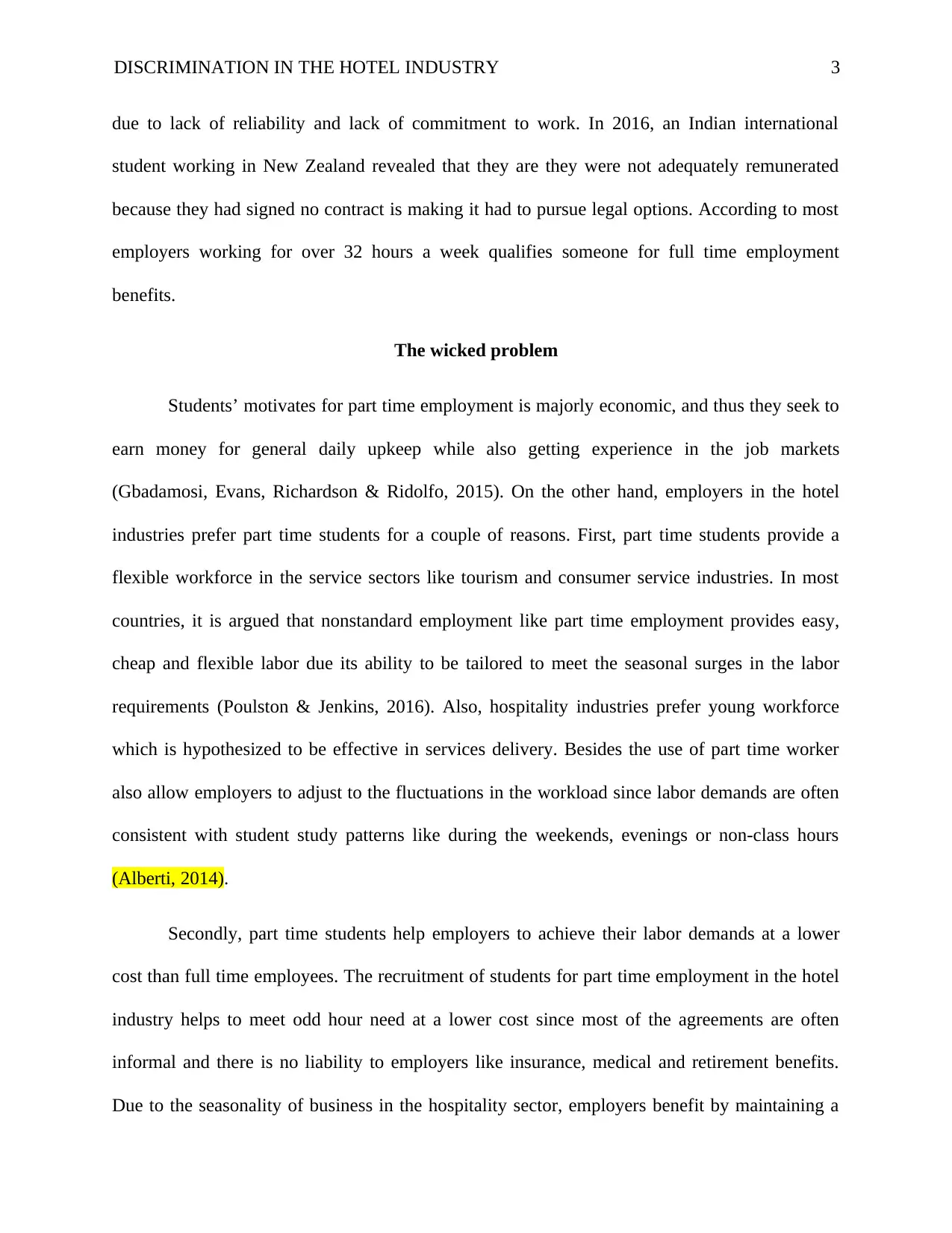
DISCRIMINATION IN THE HOTEL INDUSTRY 3
due to lack of reliability and lack of commitment to work. In 2016, an Indian international
student working in New Zealand revealed that they are they were not adequately remunerated
because they had signed no contract is making it had to pursue legal options. According to most
employers working for over 32 hours a week qualifies someone for full time employment
benefits.
The wicked problem
Students’ motivates for part time employment is majorly economic, and thus they seek to
earn money for general daily upkeep while also getting experience in the job markets
(Gbadamosi, Evans, Richardson & Ridolfo, 2015). On the other hand, employers in the hotel
industries prefer part time students for a couple of reasons. First, part time students provide a
flexible workforce in the service sectors like tourism and consumer service industries. In most
countries, it is argued that nonstandard employment like part time employment provides easy,
cheap and flexible labor due its ability to be tailored to meet the seasonal surges in the labor
requirements (Poulston & Jenkins, 2016). Also, hospitality industries prefer young workforce
which is hypothesized to be effective in services delivery. Besides the use of part time worker
also allow employers to adjust to the fluctuations in the workload since labor demands are often
consistent with student study patterns like during the weekends, evenings or non-class hours
(Alberti, 2014).
Secondly, part time students help employers to achieve their labor demands at a lower
cost than full time employees. The recruitment of students for part time employment in the hotel
industry helps to meet odd hour need at a lower cost since most of the agreements are often
informal and there is no liability to employers like insurance, medical and retirement benefits.
Due to the seasonality of business in the hospitality sector, employers benefit by maintaining a
due to lack of reliability and lack of commitment to work. In 2016, an Indian international
student working in New Zealand revealed that they are they were not adequately remunerated
because they had signed no contract is making it had to pursue legal options. According to most
employers working for over 32 hours a week qualifies someone for full time employment
benefits.
The wicked problem
Students’ motivates for part time employment is majorly economic, and thus they seek to
earn money for general daily upkeep while also getting experience in the job markets
(Gbadamosi, Evans, Richardson & Ridolfo, 2015). On the other hand, employers in the hotel
industries prefer part time students for a couple of reasons. First, part time students provide a
flexible workforce in the service sectors like tourism and consumer service industries. In most
countries, it is argued that nonstandard employment like part time employment provides easy,
cheap and flexible labor due its ability to be tailored to meet the seasonal surges in the labor
requirements (Poulston & Jenkins, 2016). Also, hospitality industries prefer young workforce
which is hypothesized to be effective in services delivery. Besides the use of part time worker
also allow employers to adjust to the fluctuations in the workload since labor demands are often
consistent with student study patterns like during the weekends, evenings or non-class hours
(Alberti, 2014).
Secondly, part time students help employers to achieve their labor demands at a lower
cost than full time employees. The recruitment of students for part time employment in the hotel
industry helps to meet odd hour need at a lower cost since most of the agreements are often
informal and there is no liability to employers like insurance, medical and retirement benefits.
Due to the seasonality of business in the hospitality sector, employers benefit by maintaining a
⊘ This is a preview!⊘
Do you want full access?
Subscribe today to unlock all pages.

Trusted by 1+ million students worldwide
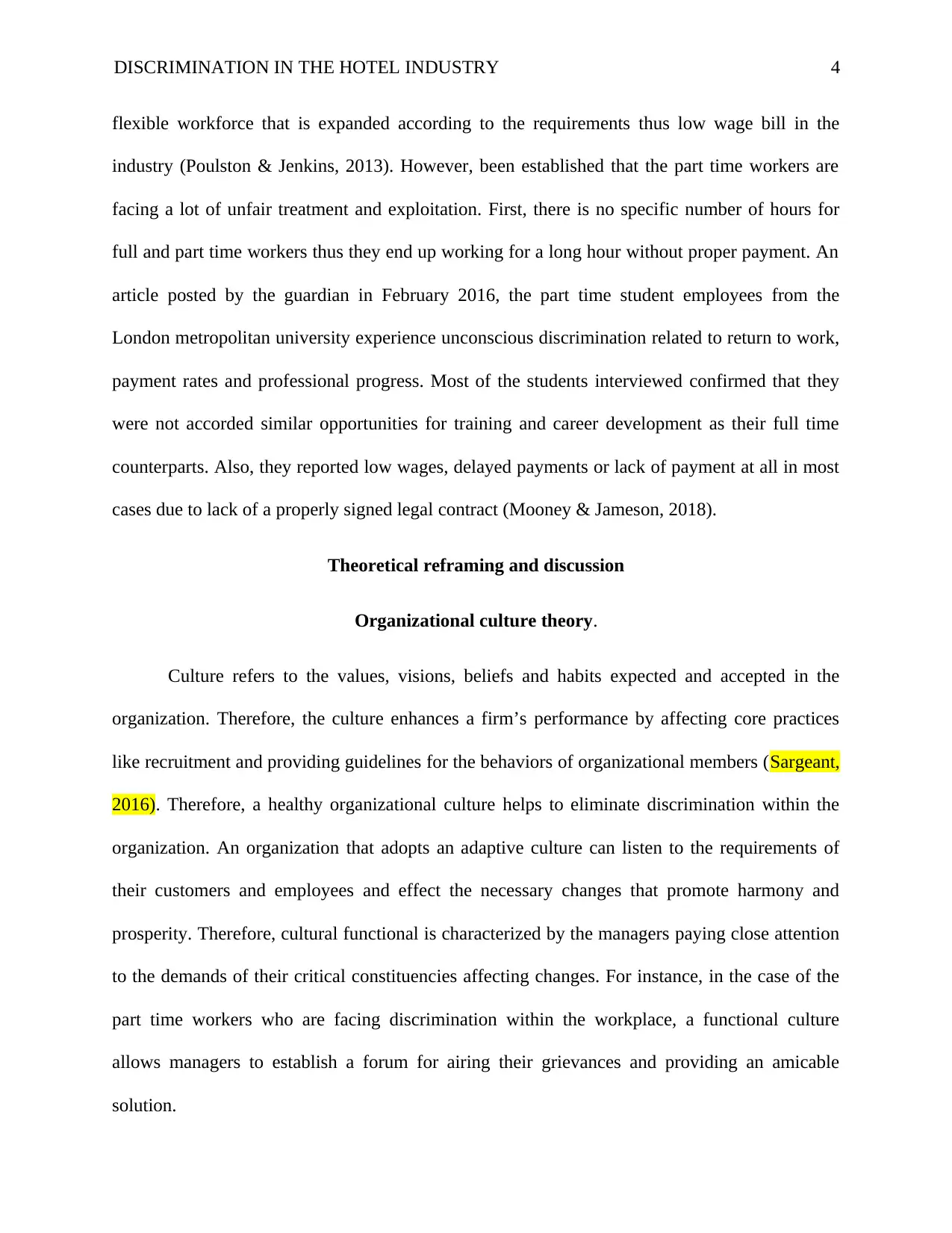
DISCRIMINATION IN THE HOTEL INDUSTRY 4
flexible workforce that is expanded according to the requirements thus low wage bill in the
industry (Poulston & Jenkins, 2013). However, been established that the part time workers are
facing a lot of unfair treatment and exploitation. First, there is no specific number of hours for
full and part time workers thus they end up working for a long hour without proper payment. An
article posted by the guardian in February 2016, the part time student employees from the
London metropolitan university experience unconscious discrimination related to return to work,
payment rates and professional progress. Most of the students interviewed confirmed that they
were not accorded similar opportunities for training and career development as their full time
counterparts. Also, they reported low wages, delayed payments or lack of payment at all in most
cases due to lack of a properly signed legal contract (Mooney & Jameson, 2018).
Theoretical reframing and discussion
Organizational culture theory.
Culture refers to the values, visions, beliefs and habits expected and accepted in the
organization. Therefore, the culture enhances a firm’s performance by affecting core practices
like recruitment and providing guidelines for the behaviors of organizational members (Sargeant,
2016). Therefore, a healthy organizational culture helps to eliminate discrimination within the
organization. An organization that adopts an adaptive culture can listen to the requirements of
their customers and employees and effect the necessary changes that promote harmony and
prosperity. Therefore, cultural functional is characterized by the managers paying close attention
to the demands of their critical constituencies affecting changes. For instance, in the case of the
part time workers who are facing discrimination within the workplace, a functional culture
allows managers to establish a forum for airing their grievances and providing an amicable
solution.
flexible workforce that is expanded according to the requirements thus low wage bill in the
industry (Poulston & Jenkins, 2013). However, been established that the part time workers are
facing a lot of unfair treatment and exploitation. First, there is no specific number of hours for
full and part time workers thus they end up working for a long hour without proper payment. An
article posted by the guardian in February 2016, the part time student employees from the
London metropolitan university experience unconscious discrimination related to return to work,
payment rates and professional progress. Most of the students interviewed confirmed that they
were not accorded similar opportunities for training and career development as their full time
counterparts. Also, they reported low wages, delayed payments or lack of payment at all in most
cases due to lack of a properly signed legal contract (Mooney & Jameson, 2018).
Theoretical reframing and discussion
Organizational culture theory.
Culture refers to the values, visions, beliefs and habits expected and accepted in the
organization. Therefore, the culture enhances a firm’s performance by affecting core practices
like recruitment and providing guidelines for the behaviors of organizational members (Sargeant,
2016). Therefore, a healthy organizational culture helps to eliminate discrimination within the
organization. An organization that adopts an adaptive culture can listen to the requirements of
their customers and employees and effect the necessary changes that promote harmony and
prosperity. Therefore, cultural functional is characterized by the managers paying close attention
to the demands of their critical constituencies affecting changes. For instance, in the case of the
part time workers who are facing discrimination within the workplace, a functional culture
allows managers to establish a forum for airing their grievances and providing an amicable
solution.
Paraphrase This Document
Need a fresh take? Get an instant paraphrase of this document with our AI Paraphraser
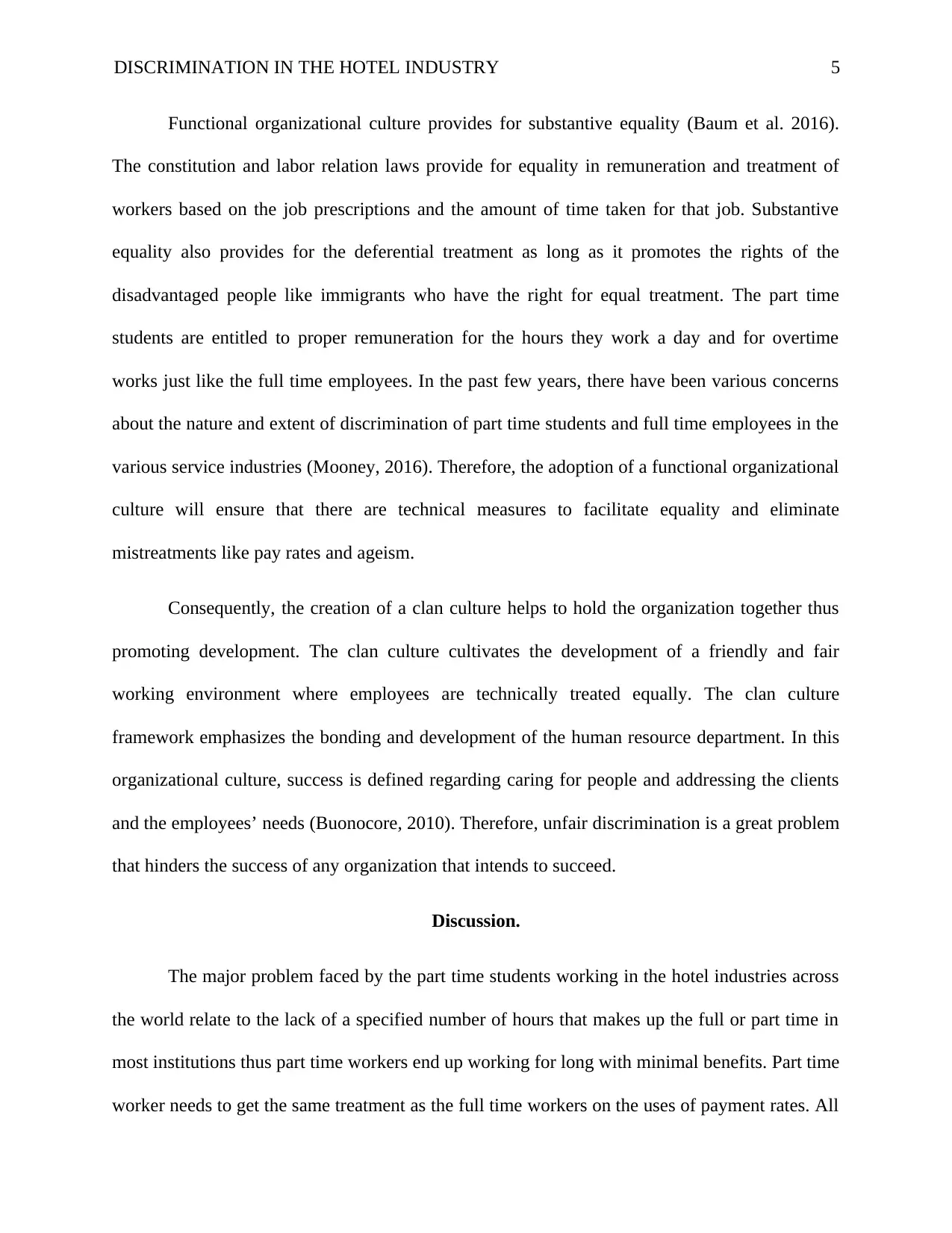
DISCRIMINATION IN THE HOTEL INDUSTRY 5
Functional organizational culture provides for substantive equality (Baum et al. 2016).
The constitution and labor relation laws provide for equality in remuneration and treatment of
workers based on the job prescriptions and the amount of time taken for that job. Substantive
equality also provides for the deferential treatment as long as it promotes the rights of the
disadvantaged people like immigrants who have the right for equal treatment. The part time
students are entitled to proper remuneration for the hours they work a day and for overtime
works just like the full time employees. In the past few years, there have been various concerns
about the nature and extent of discrimination of part time students and full time employees in the
various service industries (Mooney, 2016). Therefore, the adoption of a functional organizational
culture will ensure that there are technical measures to facilitate equality and eliminate
mistreatments like pay rates and ageism.
Consequently, the creation of a clan culture helps to hold the organization together thus
promoting development. The clan culture cultivates the development of a friendly and fair
working environment where employees are technically treated equally. The clan culture
framework emphasizes the bonding and development of the human resource department. In this
organizational culture, success is defined regarding caring for people and addressing the clients
and the employees’ needs (Buonocore, 2010). Therefore, unfair discrimination is a great problem
that hinders the success of any organization that intends to succeed.
Discussion.
The major problem faced by the part time students working in the hotel industries across
the world relate to the lack of a specified number of hours that makes up the full or part time in
most institutions thus part time workers end up working for long with minimal benefits. Part time
worker needs to get the same treatment as the full time workers on the uses of payment rates. All
Functional organizational culture provides for substantive equality (Baum et al. 2016).
The constitution and labor relation laws provide for equality in remuneration and treatment of
workers based on the job prescriptions and the amount of time taken for that job. Substantive
equality also provides for the deferential treatment as long as it promotes the rights of the
disadvantaged people like immigrants who have the right for equal treatment. The part time
students are entitled to proper remuneration for the hours they work a day and for overtime
works just like the full time employees. In the past few years, there have been various concerns
about the nature and extent of discrimination of part time students and full time employees in the
various service industries (Mooney, 2016). Therefore, the adoption of a functional organizational
culture will ensure that there are technical measures to facilitate equality and eliminate
mistreatments like pay rates and ageism.
Consequently, the creation of a clan culture helps to hold the organization together thus
promoting development. The clan culture cultivates the development of a friendly and fair
working environment where employees are technically treated equally. The clan culture
framework emphasizes the bonding and development of the human resource department. In this
organizational culture, success is defined regarding caring for people and addressing the clients
and the employees’ needs (Buonocore, 2010). Therefore, unfair discrimination is a great problem
that hinders the success of any organization that intends to succeed.
Discussion.
The major problem faced by the part time students working in the hotel industries across
the world relate to the lack of a specified number of hours that makes up the full or part time in
most institutions thus part time workers end up working for long with minimal benefits. Part time
worker needs to get the same treatment as the full time workers on the uses of payment rates. All
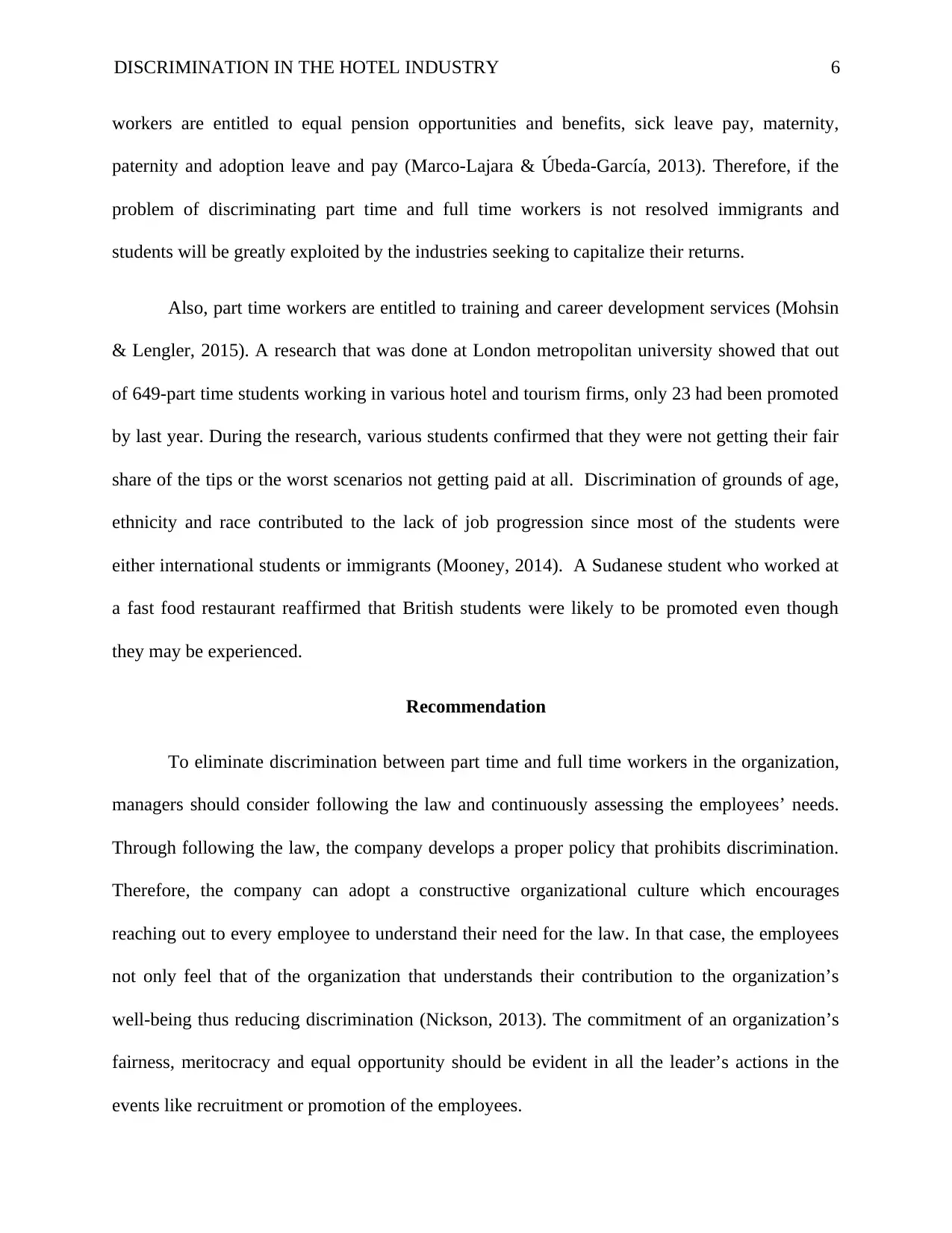
DISCRIMINATION IN THE HOTEL INDUSTRY 6
workers are entitled to equal pension opportunities and benefits, sick leave pay, maternity,
paternity and adoption leave and pay (Marco-Lajara & Úbeda-García, 2013). Therefore, if the
problem of discriminating part time and full time workers is not resolved immigrants and
students will be greatly exploited by the industries seeking to capitalize their returns.
Also, part time workers are entitled to training and career development services (Mohsin
& Lengler, 2015). A research that was done at London metropolitan university showed that out
of 649-part time students working in various hotel and tourism firms, only 23 had been promoted
by last year. During the research, various students confirmed that they were not getting their fair
share of the tips or the worst scenarios not getting paid at all. Discrimination of grounds of age,
ethnicity and race contributed to the lack of job progression since most of the students were
either international students or immigrants (Mooney, 2014). A Sudanese student who worked at
a fast food restaurant reaffirmed that British students were likely to be promoted even though
they may be experienced.
Recommendation
To eliminate discrimination between part time and full time workers in the organization,
managers should consider following the law and continuously assessing the employees’ needs.
Through following the law, the company develops a proper policy that prohibits discrimination.
Therefore, the company can adopt a constructive organizational culture which encourages
reaching out to every employee to understand their need for the law. In that case, the employees
not only feel that of the organization that understands their contribution to the organization’s
well-being thus reducing discrimination (Nickson, 2013). The commitment of an organization’s
fairness, meritocracy and equal opportunity should be evident in all the leader’s actions in the
events like recruitment or promotion of the employees.
workers are entitled to equal pension opportunities and benefits, sick leave pay, maternity,
paternity and adoption leave and pay (Marco-Lajara & Úbeda-García, 2013). Therefore, if the
problem of discriminating part time and full time workers is not resolved immigrants and
students will be greatly exploited by the industries seeking to capitalize their returns.
Also, part time workers are entitled to training and career development services (Mohsin
& Lengler, 2015). A research that was done at London metropolitan university showed that out
of 649-part time students working in various hotel and tourism firms, only 23 had been promoted
by last year. During the research, various students confirmed that they were not getting their fair
share of the tips or the worst scenarios not getting paid at all. Discrimination of grounds of age,
ethnicity and race contributed to the lack of job progression since most of the students were
either international students or immigrants (Mooney, 2014). A Sudanese student who worked at
a fast food restaurant reaffirmed that British students were likely to be promoted even though
they may be experienced.
Recommendation
To eliminate discrimination between part time and full time workers in the organization,
managers should consider following the law and continuously assessing the employees’ needs.
Through following the law, the company develops a proper policy that prohibits discrimination.
Therefore, the company can adopt a constructive organizational culture which encourages
reaching out to every employee to understand their need for the law. In that case, the employees
not only feel that of the organization that understands their contribution to the organization’s
well-being thus reducing discrimination (Nickson, 2013). The commitment of an organization’s
fairness, meritocracy and equal opportunity should be evident in all the leader’s actions in the
events like recruitment or promotion of the employees.
⊘ This is a preview!⊘
Do you want full access?
Subscribe today to unlock all pages.

Trusted by 1+ million students worldwide
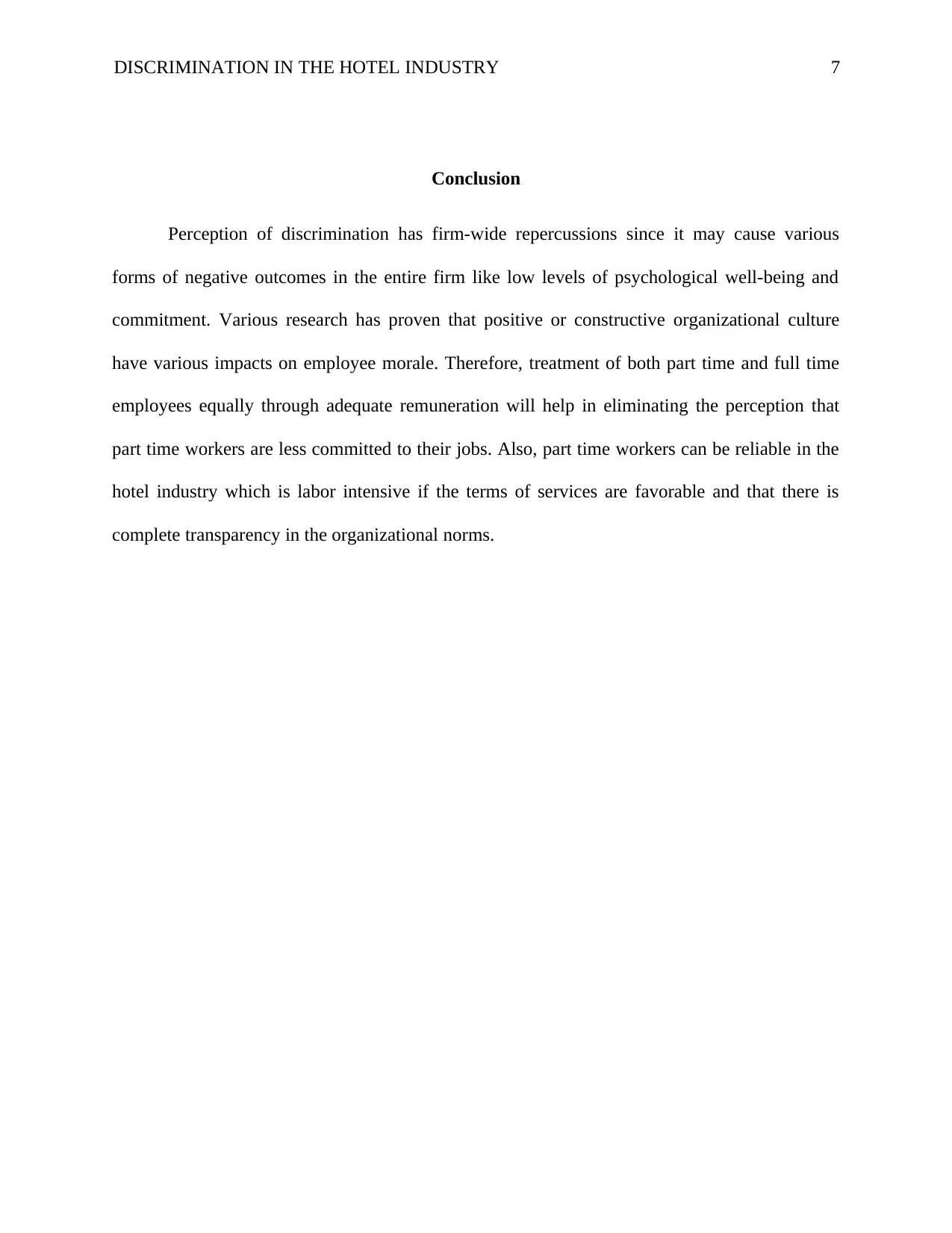
DISCRIMINATION IN THE HOTEL INDUSTRY 7
Conclusion
Perception of discrimination has firm-wide repercussions since it may cause various
forms of negative outcomes in the entire firm like low levels of psychological well-being and
commitment. Various research has proven that positive or constructive organizational culture
have various impacts on employee morale. Therefore, treatment of both part time and full time
employees equally through adequate remuneration will help in eliminating the perception that
part time workers are less committed to their jobs. Also, part time workers can be reliable in the
hotel industry which is labor intensive if the terms of services are favorable and that there is
complete transparency in the organizational norms.
Conclusion
Perception of discrimination has firm-wide repercussions since it may cause various
forms of negative outcomes in the entire firm like low levels of psychological well-being and
commitment. Various research has proven that positive or constructive organizational culture
have various impacts on employee morale. Therefore, treatment of both part time and full time
employees equally through adequate remuneration will help in eliminating the perception that
part time workers are less committed to their jobs. Also, part time workers can be reliable in the
hotel industry which is labor intensive if the terms of services are favorable and that there is
complete transparency in the organizational norms.
Paraphrase This Document
Need a fresh take? Get an instant paraphrase of this document with our AI Paraphraser
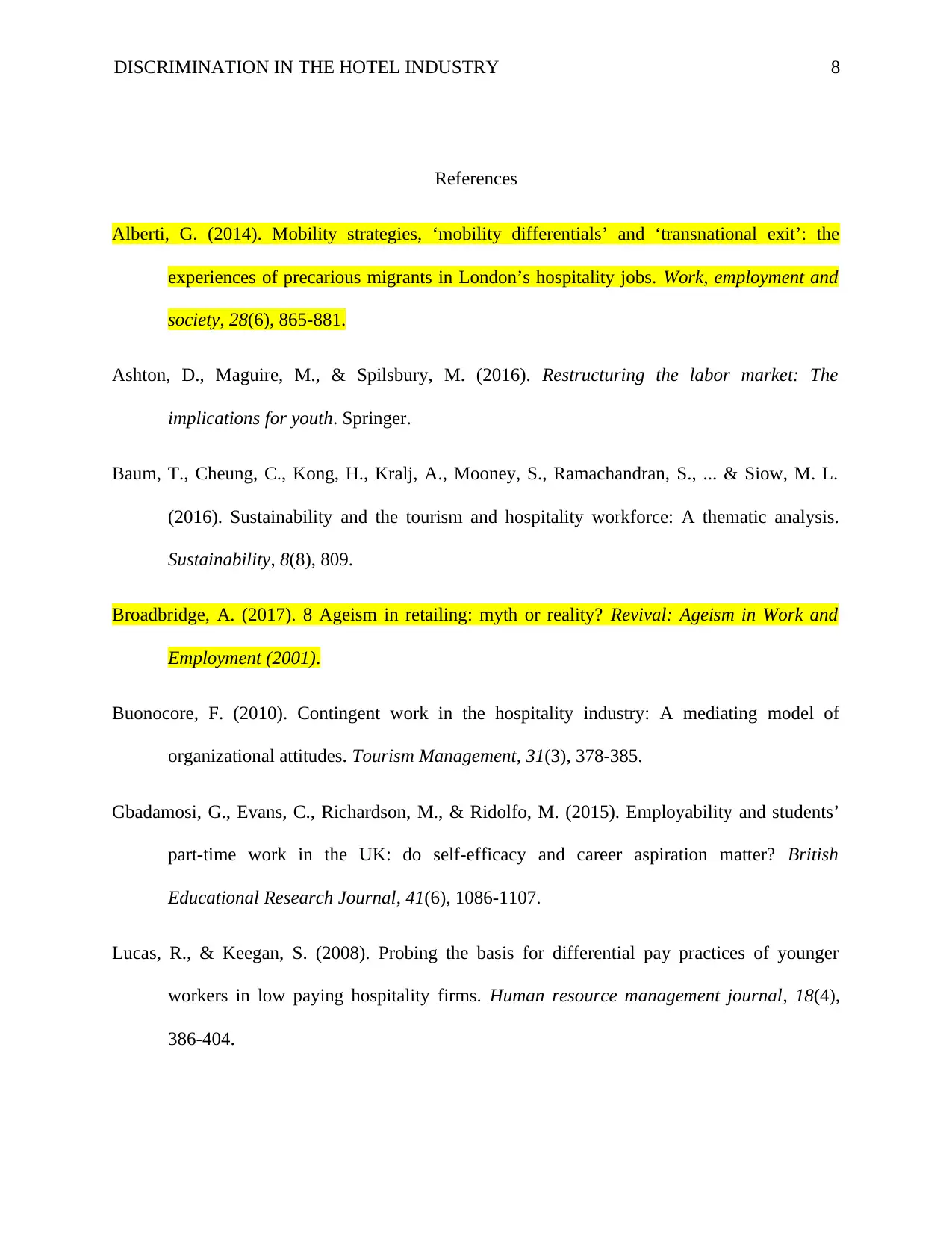
DISCRIMINATION IN THE HOTEL INDUSTRY 8
References
Alberti, G. (2014). Mobility strategies, ‘mobility differentials’ and ‘transnational exit’: the
experiences of precarious migrants in London’s hospitality jobs. Work, employment and
society, 28(6), 865-881.
Ashton, D., Maguire, M., & Spilsbury, M. (2016). Restructuring the labor market: The
implications for youth. Springer.
Baum, T., Cheung, C., Kong, H., Kralj, A., Mooney, S., Ramachandran, S., ... & Siow, M. L.
(2016). Sustainability and the tourism and hospitality workforce: A thematic analysis.
Sustainability, 8(8), 809.
Broadbridge, A. (2017). 8 Ageism in retailing: myth or reality? Revival: Ageism in Work and
Employment (2001).
Buonocore, F. (2010). Contingent work in the hospitality industry: A mediating model of
organizational attitudes. Tourism Management, 31(3), 378-385.
Gbadamosi, G., Evans, C., Richardson, M., & Ridolfo, M. (2015). Employability and students’
part‐time work in the UK: do self‐efficacy and career aspiration matter? British
Educational Research Journal, 41(6), 1086-1107.
Lucas, R., & Keegan, S. (2008). Probing the basis for differential pay practices of younger
workers in low paying hospitality firms. Human resource management journal, 18(4),
386-404.
References
Alberti, G. (2014). Mobility strategies, ‘mobility differentials’ and ‘transnational exit’: the
experiences of precarious migrants in London’s hospitality jobs. Work, employment and
society, 28(6), 865-881.
Ashton, D., Maguire, M., & Spilsbury, M. (2016). Restructuring the labor market: The
implications for youth. Springer.
Baum, T., Cheung, C., Kong, H., Kralj, A., Mooney, S., Ramachandran, S., ... & Siow, M. L.
(2016). Sustainability and the tourism and hospitality workforce: A thematic analysis.
Sustainability, 8(8), 809.
Broadbridge, A. (2017). 8 Ageism in retailing: myth or reality? Revival: Ageism in Work and
Employment (2001).
Buonocore, F. (2010). Contingent work in the hospitality industry: A mediating model of
organizational attitudes. Tourism Management, 31(3), 378-385.
Gbadamosi, G., Evans, C., Richardson, M., & Ridolfo, M. (2015). Employability and students’
part‐time work in the UK: do self‐efficacy and career aspiration matter? British
Educational Research Journal, 41(6), 1086-1107.
Lucas, R., & Keegan, S. (2008). Probing the basis for differential pay practices of younger
workers in low paying hospitality firms. Human resource management journal, 18(4),
386-404.
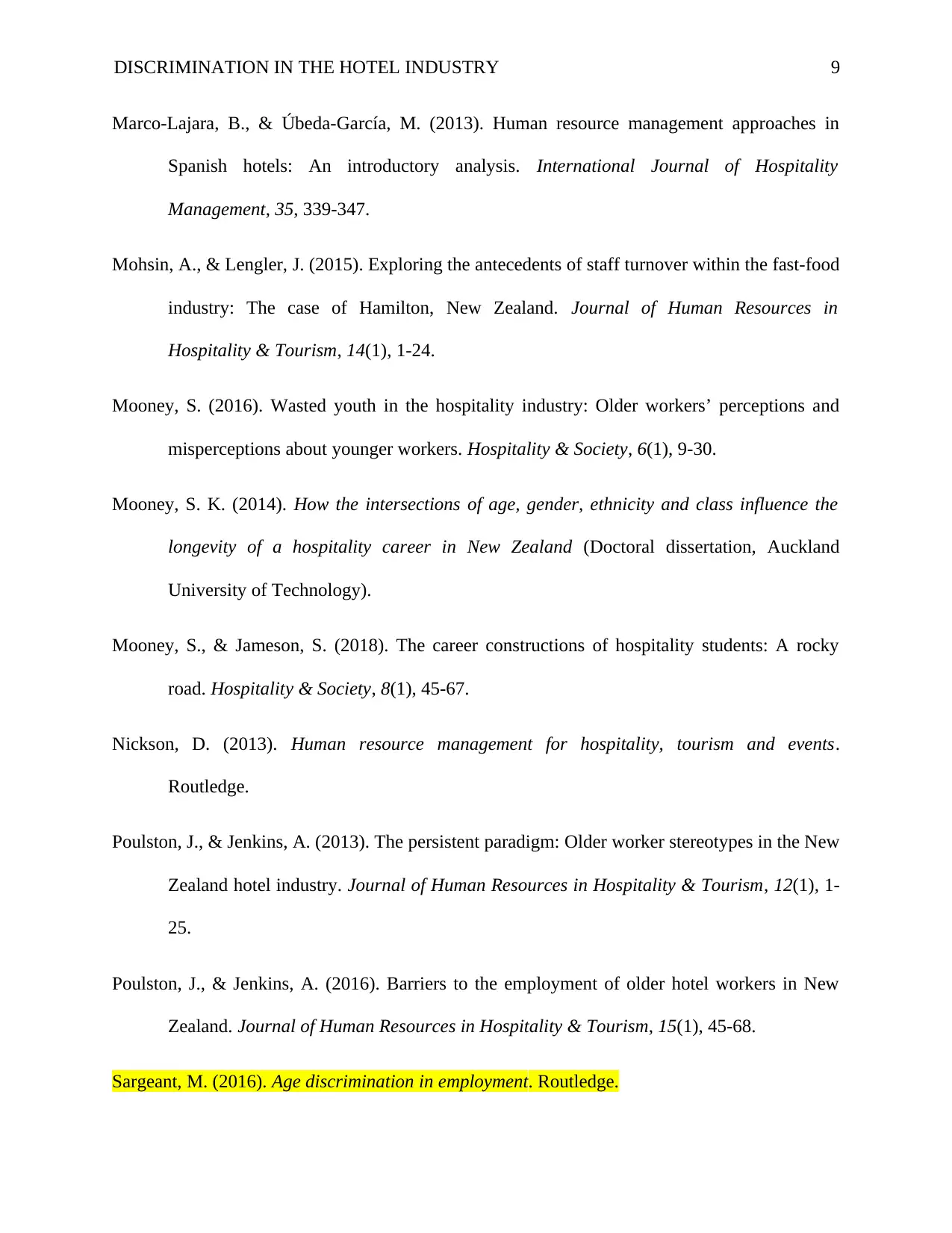
DISCRIMINATION IN THE HOTEL INDUSTRY 9
Marco-Lajara, B., & Úbeda-García, M. (2013). Human resource management approaches in
Spanish hotels: An introductory analysis. International Journal of Hospitality
Management, 35, 339-347.
Mohsin, A., & Lengler, J. (2015). Exploring the antecedents of staff turnover within the fast-food
industry: The case of Hamilton, New Zealand. Journal of Human Resources in
Hospitality & Tourism, 14(1), 1-24.
Mooney, S. (2016). Wasted youth in the hospitality industry: Older workers’ perceptions and
misperceptions about younger workers. Hospitality & Society, 6(1), 9-30.
Mooney, S. K. (2014). How the intersections of age, gender, ethnicity and class influence the
longevity of a hospitality career in New Zealand (Doctoral dissertation, Auckland
University of Technology).
Mooney, S., & Jameson, S. (2018). The career constructions of hospitality students: A rocky
road. Hospitality & Society, 8(1), 45-67.
Nickson, D. (2013). Human resource management for hospitality, tourism and events.
Routledge.
Poulston, J., & Jenkins, A. (2013). The persistent paradigm: Older worker stereotypes in the New
Zealand hotel industry. Journal of Human Resources in Hospitality & Tourism, 12(1), 1-
25.
Poulston, J., & Jenkins, A. (2016). Barriers to the employment of older hotel workers in New
Zealand. Journal of Human Resources in Hospitality & Tourism, 15(1), 45-68.
Sargeant, M. (2016). Age discrimination in employment. Routledge.
Marco-Lajara, B., & Úbeda-García, M. (2013). Human resource management approaches in
Spanish hotels: An introductory analysis. International Journal of Hospitality
Management, 35, 339-347.
Mohsin, A., & Lengler, J. (2015). Exploring the antecedents of staff turnover within the fast-food
industry: The case of Hamilton, New Zealand. Journal of Human Resources in
Hospitality & Tourism, 14(1), 1-24.
Mooney, S. (2016). Wasted youth in the hospitality industry: Older workers’ perceptions and
misperceptions about younger workers. Hospitality & Society, 6(1), 9-30.
Mooney, S. K. (2014). How the intersections of age, gender, ethnicity and class influence the
longevity of a hospitality career in New Zealand (Doctoral dissertation, Auckland
University of Technology).
Mooney, S., & Jameson, S. (2018). The career constructions of hospitality students: A rocky
road. Hospitality & Society, 8(1), 45-67.
Nickson, D. (2013). Human resource management for hospitality, tourism and events.
Routledge.
Poulston, J., & Jenkins, A. (2013). The persistent paradigm: Older worker stereotypes in the New
Zealand hotel industry. Journal of Human Resources in Hospitality & Tourism, 12(1), 1-
25.
Poulston, J., & Jenkins, A. (2016). Barriers to the employment of older hotel workers in New
Zealand. Journal of Human Resources in Hospitality & Tourism, 15(1), 45-68.
Sargeant, M. (2016). Age discrimination in employment. Routledge.
⊘ This is a preview!⊘
Do you want full access?
Subscribe today to unlock all pages.

Trusted by 1+ million students worldwide
1 out of 9
Related Documents
Your All-in-One AI-Powered Toolkit for Academic Success.
+13062052269
info@desklib.com
Available 24*7 on WhatsApp / Email
![[object Object]](/_next/static/media/star-bottom.7253800d.svg)
Unlock your academic potential
Copyright © 2020–2025 A2Z Services. All Rights Reserved. Developed and managed by ZUCOL.





